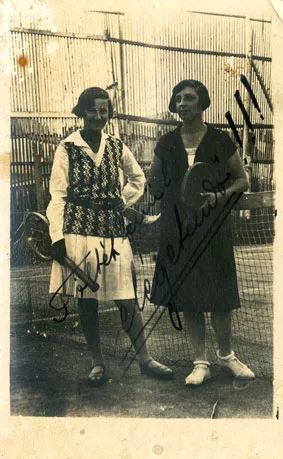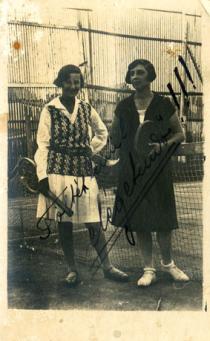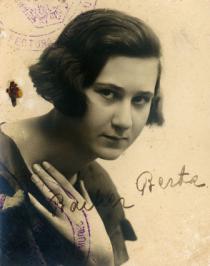The person on the right was the wife of an office-holder. She was a young woman aged 20-21, she didn’t have any children yet, and I was a 14-15 years old girl. We went to play in the morning or in the after-noon, because the office-holders came to play tennis only in the after-noon, after work of course. When the ground was free, and she had free time - I was always free, but she was a housekeeper - we went out in the morning, or when we felt like to, or if it was rainy, we didn’t go to the pool, and played tennis. I was 13 or 14 maybe when I got the racket, but I had played before, I was trying it with my brother’s racket. Here [on the photo] I already had my racket, and the white [costume] was mandatory. The racket was very expensive, it cost 2,500 lei, I remember this.
I played tennis since I was 11. My father was the manager of a large Swiss-Romanian enterprise, which ensured everything, not only to the office-holders, but to the workers as well. It was a huge factory. The big boss came from Switzerland, and said: 'You need sports and entertainment here…' - since Toplica was a big village - 'Wouldn't you like it? We should make a tennis court, don't you think?' He issued the order and gave money, everything. One of the engineers was good in it. He went to Budapest, copied the ground-plan of the tennis court on the Margit Isle, and we had the same type of tennis court. A tennis court for competitions. He kept on sending tennis balls, since balls were very expensive. It used to be a very expensive sport, it is even today in fact. It wasn't fashionable yet, it was rather an elite sport. In those times bowling and football were coming into fashion. I have a photo with my racket in hand and with my partner. It's true that I was only 14-15. My partner was a young woman, the wife of my father's colleague. First I didn't have a racket, but my brother had, or I asked from somebody. While they were sitting, I played with the ball-boys. I was skilful, and when I got 14, the grown-ups played with me as well. I always played tennis, as a wife too.
Here [in Marosvasarhely] I was the member of the MSE for 11 years, until they kicked me out. The MSE is the Sports Club of Marosvasarhely. Whoever wanted to play tennis, frequented the sports club. One could find there Romanians, Hungarians, Jews. But Jews were just a few. There were just two of us, Mrs. Reti and me, the poor Mrs. Almasi. I had the possibility, my uncle always gave me money so that I had everything. So I had a racket as well, and he gave me for my birthdays the most expensive Dunlop. The former tennis we were playing back then, as all things 60 years ago compared to present-day things, was a child's play, as I see it now. My father was right when he said: 'Sport is healthy until one doesn't get fagged out.' Now they are ten, fifteen persons injured in tennis permanently. This was unimaginable in our times. We didn't play like this, it is a jugglery what they are doing now. I was playing until the age of 32, when they kicked me out. There wasn't any difference [between people] until 1940. Then a law was introduced, that I couldn't be [a member], because I was a Jew. In the meantime three tennis courts were made in the Liget, there was a club called Muresul. It had different sections: bowling, tennis section, I don't know what else. And they told me: 'Come, play here.' Two Christians came with me out of solidarity. They quitted the MSE and came with me. I would have had anyway a partner at the Muresul. I was welcomed, because there weren't many members. I suppose the MSE had more members. It was sponsored by the Hungarian Casino as well.
There was then the Tornakert [Sports Garden] uphill, next to the gynecology [today Sportivilor Street]. It was such a nice garden, it had five courts. There were about 12 players permanently. For example the first Romanian champion, Reti's son, Tibor Reti came from there. He went to Bucharest very early, because his father's enterprise had a big warehouse there, and he lived there for a long time. Well, I don't know what he was doing, as our destinies separated. Besides he belonged to the 'upper ten-thousand'. The second wife of Reti was an extremely likeable Jewish woman, she was very ugly, but a very charming, intelligent woman. I played tennis with her. You could never feel directly that she belonged to a different class to say so. The first wife died, and she left two boys. Reti had a daughter with this second one, she must be living somewhere in Hamburg.
Generally women wore knee-deep white skirts [for tennis], and a nice short-sleeved blouse, always white. I couldn't even imagine a colored suite, because I never saw something similar. Moreover, I never so it in Pest either, [I saw] only white suits. That is why it was called once the white sport. I was always a little bit more modern as [the other women] here, because I played tennis yet in a small white shorts. Only me! As I went to Pest, and I could see it there, and I wanted the same. There was a dressing-room there [in the Tornakert, so I could change], but sometimes I dressed up at home. I was pretty! My poor mother used to tell me: 'Bella, you aren't beautiful, you aren't beautiful at all, but you are very pretty! And you are also good in presenting your prettiness, but don't exaggerate!' My poor mother… I had a wonderful pink wrap I used to put on, it wasn't buttoned up, and I ran up on the Artei [on the Artei street]. Well, sometimes the shorts was showing a little… In short I had some coquetry, to be honest… However I couldn't bring into fashion the shorts in Marosvasarhely. People got used to the fact that I was a bit extravagant. Though I didn't have many clothes, because I wasn't interested in this. I got them by chance.
I went to competitions sometimes, but my husband wouldn't let me. I participated in competitions in Gyergyoszentmiklos, in Csikszereda, the farthest place I reached was Kolozsvar, my husband agreed to it at last. However I could see he wasn't pleased with it at all, and I quitted. Bad times came as well, and I didn't feel like competing. I was happy to be willing [to play tennis], because from 1942 I was no longer in the mood for it, because they took my husband. My past ended in all means.
































